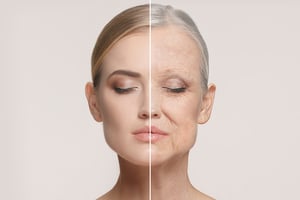
Did scientists find the fountain of youth?
You can't watch T.V. for too long without seeing an ad for a miracle product offering the key to anti-aging or a way to cover it up. From creams to hundred dollar treatments, hair dyes and more, most are seeking one goal, to look more youthful.
Contrary to their commercials, I don't think Olay* has cracked the code to preventing aging. It is possible that a team of researchers from the University at Buffalo have isolated a single gene that controls senescence.
Senescence is the process that stops cells from dividing and contributes to aging symptoms. By ramping it up, they found how easily the effect can spread to neighboring cells, making this gene a crucial target for future work on anti-aging and even cancer therapies.
Living cells have a limit to the amount of times they can divide before they stop and become "senescent cells". Over time, senescent cells build up in the body and eventually contribute to the physical symptoms we associate with aging such as increased risk of diabetes, heart disease, arthritis and cataracts. On the other hand however, completely stopping this process can cause cancer.
Realizing this, scientists have been working on a mechanism to clear out the senescent cells. This includes a new class of drugs known as senolytics. In recent trials they have been found to extend the lifespan of mice by up yo 35% and keep them in better health longer. The gene the researchers zeroed in on is the CD36 gene. This gene's activity seems to go into overdrive in senescent cells. (Irving, 2018)
While this science is newly in the works we know another way to bring youth to your cells! Ozone therapy!
Cellular aging is reversible with ozone therapy.
What are telomeres? Telomeres are repetitive DNA sequences at the end of chromosomes that get shorter with age. They are age biomarkers. The shorter the telomere the shorter the life expectancy and increased risk for age-related diseases. Oxidative stress and inflammation from smoking, obesity, alcohol and other lifestyle issues shorten telomere length.
Longer telomeres are associated with longer life and better quality of life. Reduced all cause mortality, increased longevity, and reduced incidence of chronic disease; you want long telomeres.
Researchers found that for each 1-point increase in the diet score this was linked to 1.5 fewer years of telomere aging. A 3-point change could translate to 4.5 fewer years of telomere aging on average.
We test your telomere length at Second Nature. You can live better, longer and stronger.
Irving, M. (2018, June 26). Scientists single out gene that triggers aging symptoms. Retrieved from https://newatlas.com/cell-senescence-gene-found/55195/?utm_medium=email&utm_campaign=2018-06-26 144030 USA Daily Basic 2018-06-26 144735 DARPA demonstrates new technologies behind the combat vehicles of tomorrow&utm_content=2018-06-26 144030 USA Daily Basic 2018-06-26 144735 DARPA demonstrates new technologies behind the combat vehicles of tomorrow CID_821daaddca59ac2e32b08e9238c09cde&utm_source=Campaign Monitor&utm_term=Scientists single out gene that triggers aging symptoms


